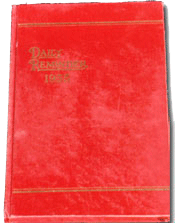Introduction to "The Diary Man" by Daniel Doan
Short Story: "The Diary Man"
Article Written May 25 2005
 Since my father’s death in 1993, I’ve been going through his papers, organizing them for his collection at the Dartmouth Library into which he’d begun putting his work during the last years of his life. In the latest batch I was sorting out, I discovered an unpublished short story he’d written in 1971, “The Diary Man.” I liked it very much and I thought you might too.
Since my father’s death in 1993, I’ve been going through his papers, organizing them for his collection at the Dartmouth Library into which he’d begun putting his work during the last years of his life. In the latest batch I was sorting out, I discovered an unpublished short story he’d written in 1971, “The Diary Man.” I liked it very much and I thought you might too.
Dan, my father, kept a journal all his life. In my early childhood, I imitated this sporadically with “Dear Diary” entries and, on exciting trips to the seacoast in New Hampshire and Maine, little travel journals. As I neared junior-high age, I got more serious about it, inspired not only by Dan but also by a young-adult novel, THE FAIR ADVENTURE by Elizabeth Janet Gray. In this book the young heroine kept a journal in a big leather loose-leaf notebook, writing down mainly thoughts, ideas, and quotations, instead of a diary account. The book’s title itself is a quote from Shakespeare that I loved the moment I read it:
“The day shall not be up so soon as I,
To try the fair adventure of tomorrow.”
So I began my version of this, using a regular Woolworth’s loose-leaf notebook, writing more lengthily, and hunting for a quotation that would sum up the entry’s events, lessons, or my attitude. I used the quote as a sort of epigraph for the entry. My parents’ collections of Dorothy Parker’s poems and Ogden Nash’s got a real workout in my searches for quotes, but I also did a lot of poring over the Untermeyer anthologies of modern British and American poets as well as everything else in my folks’ bookcases and in my own GIRL’S BOOK OF VERSE and such.
After I read Dan’s “Diary Man,” I ordered a secondhand copy of THE FAIR ADVENTURE but when it arrived I wasn’t sure if I should reread it or let it be a happy memory. Whichever I did, I knew I’d be forever grateful to Elizabeth Janet Gray (Elizabeth Gray Vining) for such good training. Then I took a peep at the first page—and I was hooked, on the story, on the memory of my young self absorbed in the story, all those emotions we encounter when we reread a book from our past. But how odd that the only thing I had remembered over the years was the journal and the quotations!
Anyway, being nothing if not obsessive, in my freshman year I began keeping a diary as well as a journal, writing daily in the one-page diary, on weekends choosing a quote and writing in the loose-leaf journal. But as schoolwork increased, I finally recognized that I did not have time for both forms and that I was spending what spare time I had on these entries when I’d prefer to be writing stories. So the journal tapered off and I only continued with the diaries. And when I was about to go off to college, I didn’t know what to do with my cumbersome accumulation of loose-leaf notebooks containing embarrassing youthful introspection, so I did what everybody hates to hear that a writer did: Like an idiot, I burned the journals in the backyard incinerator. The diaries were more portable, and at least I had the sense to keep them. Needless to say, they came in very handy when I was writing THE CHEERLEADER!
My sister, Penny, once went to a talk given by Elisabeth Ogilvie, author of the Bennett Island series and other novels. Asked if she kept a journal, Elisabeth replied that she didn’t because she felt it would “skim the cream off.” When Penny told me this, I realized that this was what I’d sensed when I stopped my journal-writing. Some writers like my father can do both, but I had to save my writing for fiction.
When I started college, I was determined to be free of both journals and diaries. Nothing but my assignment book! That lasted the first semester. Then in January 1958 I couldn’t stand it any longer and began doing what my mother and my grandmother had always done, keeping a record on the four daily lines in a five-year diary. I’ve done this ever since. It fulfills the need for a record. But five-year diaries have been getting harder and harder to find, and last year I had to search on the internet to locate my latest before I discovered that the Vermont Country Store catalogue has triumphantly brought them back. Why did they become rare?
I gather that there is new interest in journal-keeping; indeed, “journal” seems to have become a verb! And of course there’s the even newer version, blogging.
The need to keep a record. In GREEN THOUGHTS: A WRITER IN THE GARDEN, Eleanor Perenyi muses, “(I) wonder if the garden would exist without the journal, such as a life may appear half-lived without a diary to record it.”
Here is my father’s short story on the subject.
Photo: Ruth's 1955 diary; the gold lettering reads, "Daily Reminder 1955."
-
